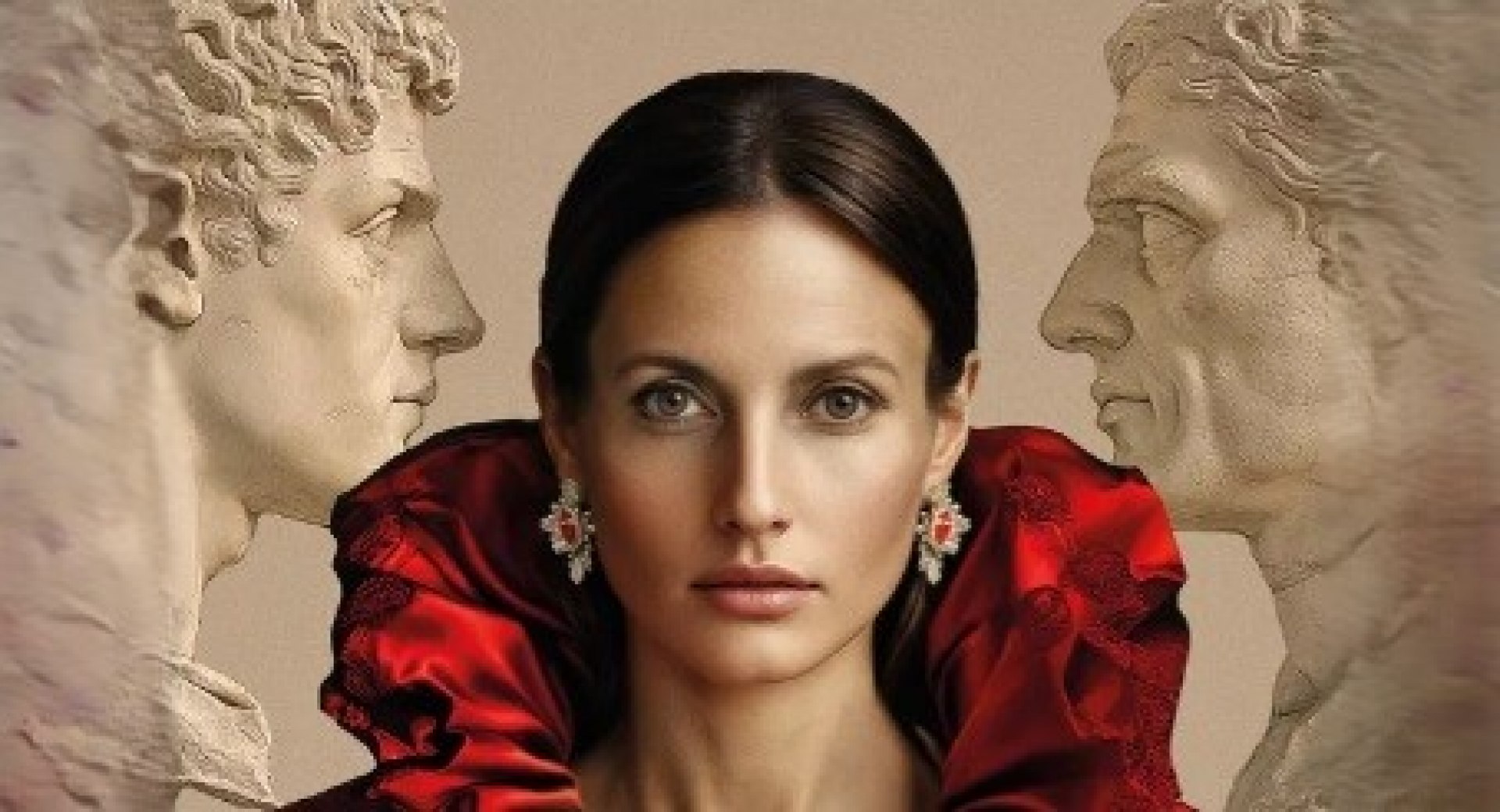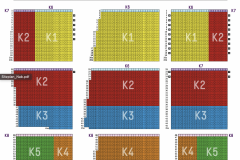Tosca
Mo | Tu | We | Th | Fr | Sa | Su |
TOSCA - Opera by Giacomo Puccini
A story of love, jealousy, violence, and intrigue meets breathtaking sounds: With Giacomo Puccini's melodrama Tosca, one of the world's most popular operas returns in 2026 to the St. Margarethen quarry, Europe's most beautiful open-air stage. Rome around 1800. The singer Floria Tosca and the painter Mario Cavaradossi fall madly in love, but the unscrupulous police chief Scarpia is determined to ruin their happiness and does everything he can to manipulate Tosca to win her over. When Cavaradossi offers sanctuary to the wanted political prisoner Angelotti, Scarpia exploits his power and presents Tosca with a choice: either she swears her eternal love to him, or he will ensure Cavaradossi's end. Will Tosca and her lover be able to overcome the shadows of fate?
Giacomo Puccini delivers a musical rollercoaster of emotions—from Tosca's poignant "Vissi d'arte" to Cavaradossi's powerful "Recondita armonia" to Scarpia's somber aria "Ha più forte sapore." A firework of emotions with gripping melodies that resonate perfectly in the rocky landscape of the St. Margarethen quarry.
Synopsis
Act 1
Inside the church of Sant'Andrea della Valle
Cesare Angelotti, former consul of the Roman Republic and now an escaped political prisoner, runs into the church and hides in the Attavanti private chapel – his sister, the Marchesa Attavanti, has left a key to the chapel hidden at the feet of the statue of the Madonna. The elderly Sacristan enters and begins cleaning. The Sacristan kneels in prayer as the Angelus sounds.
The painter Mario Cavaradossi arrives to continue work on his picture of Mary Magdalene. The Sacristan identifies a likeness between the portrait and a blonde-haired woman who has been visiting the church recently (unknown to him, it is Angelotti's sister the Marchesa). Cavaradossi describes the "hidden harmony" ("Recondita armonia") in the contrast between the blonde beauty of his painting and his dark-haired lover, the singer Floria Tosca. The Sacristan mumbles his disapproval before leaving.
Angelotti emerges and tells Cavaradossi, an old friend who has republican sympathies, that he is being pursued by the Chief of Police, Baron Scarpia. Cavaradossi promises to assist him after nightfall. Tosca's voice is heard, calling to Cavaradossi. Cavaradossi gives Angelotti his basket of food and Angelotti hurriedly returns to his hiding place.
Tosca enters and suspiciously asks Cavaradossi what he has been doing – she thinks that he has been talking to another woman. After Cavaradossi reassures her, Tosca tries to persuade him to take her to his villa that evening: "Non la sospiri, la nostra casetta" ("Do you not long for our little cottage"). She then expresses jealousy over the woman in the painting, whom she recognises as the Marchesa Attavanti. Cavaradossi explains the likeness; he has merely observed the Marchesa at prayer in the church. He reassures Tosca of his fidelity and asks her what eyes could be more beautiful than her own: "Qual'occhio al mondo" ("What eyes in the world").
After Tosca has left, Angelotti reappears and discusses with the painter his plan to flee disguised as a woman, using clothes left in the chapel by his sister. Cavaradossi gives Angelotti a key to his villa, suggesting that he hide in a disused well in the garden. The sound of a cannon signals that Angelotti's escape has been discovered. He and Cavaradossi hasten out of the church.
The Sacristan re-enters with choristers, celebrating the news that Napoleon has apparently been defeated at Marengo. The celebrations cease abruptly with the entry of Scarpia, his henchman Spoletta and several police agents. They have heard that Angelotti has sought refuge in the church. Scarpia orders a search, and the empty food basket and a fan bearing the Attavanti coat of arms are found in the chapel. Scarpia questions the Sacristan, and his suspicions are aroused further when he learns that Cavaradossi has been in the church; Scarpia mistrusts the painter, and believes him complicit in Angelotti's escape.
When Tosca arrives looking for her lover, Scarpia artfully arouses her jealous instincts by implying a relationship between the painter and the Marchesa Attavanti. He draws Tosca's attention to the fan and suggests that someone must have surprised the lovers in the chapel. Tosca falls for his deceit; enraged, she rushes off to confront Cavaradossi. Scarpia orders Spoletta and his agents to follow her, assuming she will lead them to Cavaradossi and Angelotti. He privately gloats as he reveals his intentions to possess Tosca and execute Cavaradossi. A procession enters the church singing the Te Deum; exclaiming 'Tosca, you make me forget even God!', Scarpia joins the chorus in the prayer.
Act 2
Scarpia's apartment in the Palazzo Farnese, that evening
Scarpia, at supper, sends a note to Tosca asking her to come to his apartment, anticipating that two of his goals will soon be fulfilled at once. His agent, Spoletta, arrives to report that Angelotti remains at large, but Cavaradossi has been arrested for questioning. He is brought in, and an interrogation ensues. As the painter steadfastly denies knowing anything about Angelotti's escape, Tosca's voice is heard singing a celebratory cantata elsewhere in the Palace.
She enters the apartment in time to see Cavaradossi being escorted to an antechamber. All he has time to say is that she mustn't tell them anything. Scarpia then claims she can save her lover from indescribable pain if she reveals Angelotti's hiding place. She resists, but the sound of screams coming through the door eventually breaks her down, and she tells Scarpia to search the well in the garden of Cavaradossi's villa.
Scarpia orders his torturers to cease, and the bloodied painter is dragged back in. He is devastated to discover that Tosca has betrayed his friend. Sciarrone, another agent, then enters with news: there was an upset on the battlefield at Marengo, and the French are marching on Rome. Cavaradossi, unable to contain himself, gloats to Scarpia that his rule of terror will soon be at an end. This is enough for the police to consider him guilty, and they haul him away to be executed.
Scarpia, now alone with Tosca, proposes a bargain: if she gives herself to him, Cavaradossi will be freed. She is revolted, and repeatedly rejects his advances, but she hears the drums outside announcing an execution. As Scarpia awaits her decision, she prays, asking why God has abandoned her in her hour of need: "Vissi d'arte" ("I lived for art"). She tries to offer money, but Scarpia is not interested in that kind of bribe: he wants Tosca herself.
Spoletta returns with the news that Angelotti has killed himself upon discovery, and that everything is in place for Cavaradossi's execution. Scarpia hesitates to give the order, looking to Tosca, and despairingly she agrees to submit to him. He tells Spoletta to arrange a mock execution, both men repeating that it will be "as we did with Count Palmieri", and Spoletta exits.
Tosca insists that Scarpia must provide safe-conduct out of Rome for herself and Cavaradossi. He easily agrees to this and heads to his desk. While he's drafting the document, she quietly takes a knife from the supper table. Scarpia triumphantly strides toward Tosca. When he begins to embrace her, she stabs him, crying "this is Tosca's kiss!" Once she's certain he's dead, she ruefully says "now I forgive him." She removes the safe-conduct from his pocket, lights candles in a gesture of piety, and places a crucifix on the body before leaving.
Act 3
The upper parts of the Castel Sant'Angelo, early the following morning
A shepherd boy is heard offstage singing (in Romanesco dialect) "Io de' sospiri" ("I give you sighs") as church bells sound for matins. The guards lead Cavaradossi in and a jailer informs him that he has one hour to live. He declines to see a priest, but asks permission to write a letter to Tosca. He begins to write, but is soon overwhelmed by memories: "E lucevan le stelle" ("And the stars shone").
Tosca enters and shows him the safe-conduct pass she has obtained, adding that she has killed Scarpia and that the imminent execution is a sham. Cavaradossi must feign death, after which they can flee together before Scarpia's body is discovered. Cavaradossi is awestruck by his gentle lover's courage: "O dolci mani" ("Oh sweet hands"). The pair ecstatically imagine the life they will share, far from Rome. Tosca then anxiously coaches Cavaradossi on how to play dead when the firing squad shoots at him with blanks. He promises he will fall "like Tosca in the theatre".
Cavaradossi is led away, and Tosca watches with increasing impatience as the firing squad prepares. The men fire, and Tosca praises the realism of his fall, "Ecco un artista!" ("What an actor!"). Once the soldiers have left, she hurries towards Cavaradossi, urging him, "Mario, su presto!" ("Mario, up quickly!"), only to find that Scarpia betrayed her: the bullets were real. Heartbroken, she clasps her lover's lifeless body and weeps.
The voices of Spoletta, Sciarrone, and the soldiers are heard, shouting that Scarpia is dead and Tosca has killed him. As the men rush in, Tosca rises, evades their clutches, and runs to the parapet. Crying "O Scarpia, avanti a Dio!" ("O Scarpia, we meet before God!"), she flings herself over the edge to her death.
Program and cast
Römersteinbruch Sankt Margarethen
The Festival arena in the Römersteinbruch St. Margarethen is Europe's biggest natural stage. The open-air concert hall has an area of 7,000 square metres, with space for 4,670 people. Its unique acoustics and its special atmosphere alone make it the perfect place to experience the thrilling world of opera. The impressive setting arouses emotions that go beyond the confines of music.
Unforgettable experience
The monumental rockface, the unique acoustics and the special climate and the fauna and flora all contribute to an unforgettable evening at the opera. The Festival arena in the Roman quarry arouses emotions, creates tension and brings people closer. An exclusive location that our audiences return to time after time.
The St. Margarethen Opera Festival is about 70 km from Vienna.
From Vienna
• A2 towards Graz
• At the Guntramsdorf intersection switch to the A3 towards Eisenstadt / Neusiedler See
• Take the Eisenstadt Süd exit, then turn right on to the B52 going towards St. Margarethen
• At the next roundabout take the second exit and follow the road
• At the roundabout at the far end of St. Margarethen, take the second exit
• You'll see a green sign marked "Festspielgelände": turn left, park the car and enjoy your evening!
From Graz
• A2 towards Vienna
• At the Wiener Neustadt intersection switch to the S4 towards Eisenstadt / Mattersburg
• At the Mattersburg intersection switch to the S31 towards Eisenstadt / Sopron
• Take the Eisenstadt Süd exit, then turn right on to the B52 going towards St. Margarethen
• At the next roundabout take the second exit and follow the road
• At the roundabout at the far end of St. Margarethen, take the second exit
• You'll see a green sign marked "Festspielgelände": turn left, park the car and enjoy your evening!
From Linz
• At the Steinhäusl intersection, switch to the A21 towards Wien Süd / Graz
• At the Vösendorf intersection, switch to the A2 towards Eisenstadt / Graz wechseln
• At the Guntramsdorf intersection, switch to the A3 towards Eisenstadt / Neusiedler See
• Take the Eisenstadt Süd exit, then turn right on to the B52 going towards St. Margarethen
• At the next roundabout take the second exit and follow the road
• At the roundabout at the far end of St. Margarethen, take the second exit
• You'll see a green sign marked "Festspielgelände": turn left, park the car and enjoy your evening!
There are plenty of parking spaces available at no charge on the Festival site!
Experience stone quarry
Since 1996, the stone quarry of St. Margarethen has been a meeting place for international opera friends in Europe. The location at the center of a historically significant cultural landscape promises a journey into unique worlds of experience.
With the quality claim to offer popular and high-quality opera productions, the opera in the Steinbruch is the same attraction for an enthusiastic audience as well as for international opera stars and musicians.
Under the private foundation Esterházy as owner, this location experienced a comprehensive expansion in 2006. The young, international architectural group AWG from Vienna has understood this with a sense of sensitivity to give the sensitive space a very exciting architecture.
Festival Area
The Steinbruch in St. Margarethen is one of the most beautiful and imposing open-air arenas in Europe, with two stages of unique atmosphere and acoustics: the main stage with 7,000 m2, a huge open-air concert hall with almost 5,000 spectator seats and the Ruffini stage with up to 2,300 seats . It was named after Romulo Ruffini, the head of Prince Esterházy's stone quarry.
A modern infrastructure provides you with numerous amenities during your visit to the Opera in the Steinbruch. The access to the quarry through a spacious ramp provides a special experience: wonderful views of the landscape surrounding the quarry, as well as a first glimpse into the cultural experience to be expected. From here, visitors can already take a look at the stage (s), the opera lounge, the rocky crags and the lively activity before a wonderful opera performance.
Gastronomy
Opernlounge
An evening at the Opernlounge in the Steinbruch St. Margarethen is an experience for all senses! Here, a stylish stage for undisturbed receptions, private jubilees as well as representative events with friends or business partners is offered. Our catering partner serves delicious delicacies and fine wines. Bookable for small groups from 2 persons or companies up to 200 persons.
Gastronomy in the foyer
In the large foyer park international specialties and regional delicacies are served. Enjoy the culinary pleasures before the performance and during the break, be it small snacks or hot dishes and sweet delicacies for coffee. The special offer is rounded off by noble wines from the Esterházy vineyard and the winegrowing community "the st. Margarethener".
Accessibility & Shuttleservice
Accessibility
For people with handicaps, the opera in the Steinbruch offers a special service on site as well as discounts on ticket purchases.
Special parking spaces
Visitors with wheelchairs have their own parking area in the parking lot at the festival grounds. This is assigned by the folder staff on site. We appreciate your understanding that there is only a limited number of parking spaces available.
Barrier-free access
The access to the grounds of the opera in the Steinbruch and to the tribune is via a barrier-free ramp and is therefore also suitable for people with handicaps or wheelchair users.
Accessible toilets
There are barrier-free and wheelchair-accessible toilets on the festival grounds.
Discounts for people with disabilities
People with handicap receive 10% discount for a card on the normal price in all categories (except footless rows). Wheelchair users and their accompanying persons receive a 50% discount on the standard price for the wheelchair spaces defined in the seating plan
Shuttle service from the parking area to the grandstand
People with disabilities and elderly persons with reduced mobility are offered free transportation from the main entrance to the stone quarry to the grandstand. The shuttle bus provided for this purpose is equipped with wheelchair access and is supervised by qualified personnel
Traveling from Vienna
A2 direction Graz • at junction Guntramsdorf change to A3 direction Eisenstadt / Neusiedler See • exit Eisenstadt Süd, follow the B52 in the direction of St. Margarethen • take the second exit at the next roundabout and follow the road • at the roundabout at the end of St. Margarethen follow the Take the second exit • turn left at the green sign "Festspielgelände" You are located in the parking lot of the opera in the Steinbruch.
Bad weather
Weatherproof clothing
The performances at the Steinbruch St. Margarethen are open-air and are performed in the open air. The performances take place, if necessary, even in unfavorable weather. For this reason, we advise our guests to wear rainproof, warm clothing and solid shoes in case of bad weather forecast.
Cancellation, postponement and interruption
Cancellation can only take place at the beginning of the performance and can only be pronounced on the spot by the local festival committee. The Festiviteitung reserves the right to postpone the beginning of the introduction or to interrupt the performance due to weather conditions.
Weather report
The current weather report can also be found at www.zamg.ac.at

 EN
EN DE
DE IT
IT FR
FR ES
ES RU
RU JP
JP RO
RO
 Seating plan
Seating plan 